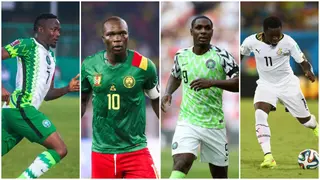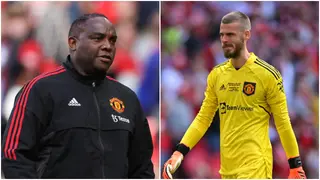Rocket man Messi ready to fire MLS lift-off
Football
For many lovers of the beautiful game, players' moves to the Middle East are widely considered one last huge paycheck - particularly for those in their career twilight years.
This claim can hardly be faulted, especially considering this is backed up by history dating as far back as the late 1970s, when Brazilian legend, Rivelino, joined Saudi Arabian side, Al-Hilal.
Ultimately, the Gulf region has always been seen as a lucrative haven and something of a final staging post for ageing stars, with Rivelino’s case not being the only example.

As reported by CNBC, Brazil’s 1994 World Cup winners, Romario and Bebeto came to the Middle East, failed to stay long, and provided little to no value for money considering the huge wages they earned in the 90s.
Rocket man Messi ready to fire MLS lift-off
Football
Denilson, another Brazilian star who made the headlines for his dribbling skills and also as one of the most expensive players in the sport while at Real Betis, played with Al-Nassr for only two months in 2007.
With memories of these still fresh in the minds of some fans, it was expected that eyebrows were going to be raised when the signing of Cristiano Ronaldo was announced by the Saudi giants in January this year.
As reported by Marca, the veteran's two-and-a-half-year contract, reportedly worth up to €200 million ($212mil) per year including commercial agreements, made the 38-year-old the highest-paid footballer in history, and the highest-paid athlete in the world.
For context, Ronaldo’s individual annual earnings will exceed the total staff wage bill for roughly half of the clubs in the English Premier League.
Saudi Professional League side, Al-Ittihad, have also completed the signing of Real Madrid forward, Karim Benzema, whose contract is believed to be an estimated €100mil per season, quoting additional reports from Marca.
Inter Miami player responds to Messi's impending arrival with brutally honest statement
Football
These effort also appear reminiscent of a similar scheme a decade ago, which saw China seeking to force its way into the global football conversation through a series of high-profile and high-money acquisitions.
The Asian country's bold plan was eventually marred by broken contracts, economic implosions, and the global coronavirus pandemic.

So why does Saudi's Public Investment Fund want to go through the path which seems to lead to the abyss again? What is in it for the kingdom, and why are they keen on bringing Europe’s biggest stars to the Middle East?
Sports Brief looks at some of the possible reasons:
Al-Nassr’s signing of Ronaldo is seen by many as being beyond just football. It is a marketing exercise that enables the kingdom to diversify its commercial appeal beyond the natural resources it is known for.
Taking a closer look at the social media following the Portuguese veteran's status brings, it is far greater than that of an individual football club in the region.
The tactics employed by Apple and Adidas to attract Lionel Messi to the MLS
Football
Saudi Arabia has a young population, so Ronaldo will help attract a generation which would 'take the 'bait' for the brands associated with him. The Spanish Super Cup is also held in the region and will continue to do so, at least until 2030.
This decision of the Royal Spanish Football Federation, through Gerard Piqué's Kosmos, has helped promoted a rapprochement between the two countries from a sporting point of view.

More recently, Italy has joined this trend and held the final of the Supercoppa in the same stadium as Real Madrid and Barcelona did the Spanish cup - the King Fahd International Stadium in Riyadh.
Just as Dakar in Senegal is synonymous with motor racing, the Kingdom of Saudi Arabia wants the region linked most with football and sports in general. It is about changing the perception of the world about the nation.
Sulley Muntari, Vincent Aboubakar, Odion Ighalo and the 2 Other African stars to play in Saudi
Football
Vision 2030, as popularly referred to by many, is the cornerstone of a project that encompasses a whole series of initiatives that aim to elevate the Middle Eastern country amid concerns and scrutiny.
Saudi Arabia is clearly making a great effort to host the best competitions in all sports at the international level. One of the most important - and one that Riyadh has already secured - is the 2029 Asian Winter Games.
Oil company, Aramco, is also a major sponsor of the Formula 1 series. But the Public Investment Fund’s splashiest efforts are surely in golf, pouring billions in creating LIV Golf to rival established tours in North America and Europe.
Another reason for this sudden drive into sport could be a plan to make the Saudi Pro League the most dominant domestic football league in Asia, which coincides with the whims of the country’s leadership.
McCarthy gives honest verdict on de Gea amidst contract standstill
Football
Going by the recent showing of the nation at the 2022 World Cup in Qatar, where they recorded a shocking win against eventual champions, Argentina, a foundation is definitely there for building upon.

One way is to continue attracting marquee names to the Saudi Professional League. While the size of the country's war chest remains unclear, it is believed to hefty considering the list of players identified as potential recruits.
Much of the money invested in the league and clubs in recent times has come from the Public Investment Fund, the country’s sovereign wealth fund chaired by the kingdom’s powerful crown prince, Mohammed bin Salman.
For the Middle Eastern kingdom to make these massive investments, there are economic benefits, there are political benefits, there are societal benefits, and the financial cost is therefore of complete irrelevance.
Sports Brief reported on Aleksander Ceferin, president of UEFA, downplaying concerns over the potential threat Saudi Arabia's spending power poses to prominent European clubs.
The chief of the European football body remains sceptical about an rumoured exodus of players and has expressed doubts regarding the approach of these financially dominant teams.